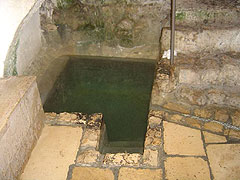Question & Answer With Rabbi Dovid Sears - A Story About The Baal Shem Tov
 (Photograph courtesy of Sofer of Tzfat)
(Photograph courtesy of Sofer of Tzfat)
A Simple Jew asks:
In Degel Machaneh Ephraim, Parshas Balak, the Degel relates a story that probably occurred while the Baal Shem Tov was visiting Istanbul on his journey to Eretz Yisroel:
"I heard from my grandfather that once he went to a mikveh in a place amongst Arabs. When he returned from the mikveh he was afraid of touching an Arab. Later, he heard two Arabs nearby talking to each other and telling each other to be careful from touching that impure Jew."
What do you think the Degel is trying to teach us with this story about the Baal Shem Tov?
Rabbi Dovid Sears responds:
In its context in Degel Machaneh Ephraim, the story comes as an aside to a d'rush about the necessity of Israel remaining separate from other nations, so that they should not emulating the ways of those who do not follow the derekh ha-Torah. If so, they would be denounced by the accusing angels, who appeared before the Divine Throne at the hour of yetzi'as Mitzrayim protesting, "These [meaning the Egyptians] are 'ovdei 'avodah zorah, and so are these [meaning the Bnei Yisrael]...."
On the face of it, the Baal Shem Tov's great merit caused his wish to not be touched to be reflected in the Arabs' aversion to touching him for their own reasons -- which mirrored his. All this was min ha-Shomayim, and follows the rule that Hashem watches over his tzaddikim with a special hashgochah.
The fact that the Arabs had their own ideas of tumah and taharah seems to be another example of "zeh le-umas zeh 'asah Elokim," i.e. that Hashem created a universe in which the holy and unholy are parallel structures.
Another example of this idea is Rabbi Nachman's story, "The Master of Prayer," in which the inhabitants of the Land of Wealth create a religion that parallels the rites of the Beis HaMikdosh, complete with "animal" sacrifices that consist of poor people designated as animals, whose depleted bank accounts have caused them to lose their human status; prayers directed to human "gods" who have gained such status by amassing fortunes; and laws of ritual purity based on wealth. Of course, all this is satirical; yet it has profound depths of meaning, too.
As for why the Baal Shem Tov had such a concern in the first place, we know that like other kabbalists the Baal Shem Tov was particular about using the mikveh, not just because of the chumrah of takanas Ezra, but for spiritual reasons alone. He attained certain mystical perceptions both when he was under the water and afterward, as a result of the state of taharah that the mikveh produced. It seems most likely that this is why he was particular about who touched him.
UDATE: Addition from Rabbi Dovid Sears:
This story should not be construed as an expression of hostility to Arabs or other non-Jews. See the section "A Light Unto the Nations" from the anthology "The Path of the Baal Shem Tov," pp. 85-86, for a few entries about compassion and respect for other nations in the teachings of the "Father of Chassidus."









3 Comments:
The story probably happened with turks when Baal Shem Tov was in Stambul. Term Ishmoeylim is often used to denote muslims in Yidishe sforim, and not only particularly arabs.
A Yid:
You are right about the term "Yishmaelim" in seforim in general. However, Rabbi Nachman seems to believe that the Turks are the true Yishmaelim, if I understand him right.
See Chayei Moharan # 462:
"The Rebbe [R. Nachman] said: 'Yesterday the Turk [Yiddish: "Torg"] came to me in a dream and complained about the various powers waging war against him. I had great pity for him -- and he really deserves pity, because he still goes by his original name Yishmael, while in the case of the other nations, their identity is unknown, because they have all become mixed together [see Yadayim 4:4, that Sancheriv of Assyria mixed up all the nations]. However, the Turks still go by their original name [Yishmael]. I gave him some advice, and it appears he also knew about this strategy, but he pretended not to know..."
He goes on to say that the Yishmaelim have much power, due to the incident of Hagar and her son Yishmael, of whom the Torah states, "And I will make him, too, a great nation... " as we read on Rosh Hashanah.
Admittedly, this is a very mysterious sichah. But the point about the Turks being the Yishmaelim seems clear. Unless the Rebbe is not using the term "Turk" in such a limited national sense -- which would bring us back to Square One!
-- Dovid Sears
The obvious (from a neutral position)is that a man as spiritually advanced as Baal Shem Tov was asking; what is the seperation that man creates by calling anothe man unclean, is it rational, what are the ramifications on our souls, what does it make us?
Post a Comment
<< Home